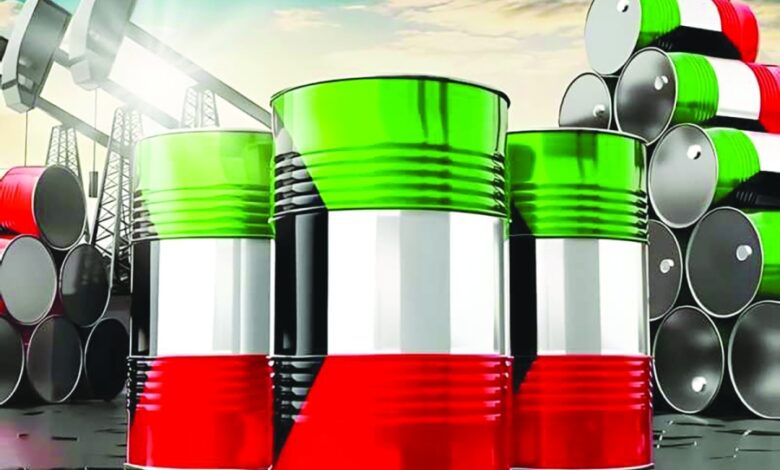
Kuwait’s projected budget deficit of 6.306 billion dinars for the 2025/2026 fiscal year is steadily shrinking, thanks to the recent surge in global oil prices sparked by the escalating Iran-Israel conflict.
Over the past 11 days, the price of Kuwaiti crude has climbed by more than 15.6%, or $10.47 per barrel, rising from $67.17 on June 13 to $77.64. This jump follows U.S. strikes on Iranian nuclear facilities and broader Middle East instability, which have heightened fears of oil supply disruptions.
Brent crude futures mirrored this trend, surging up to 18% and reaching a five-month high of $79.04. Although the S&P 500 index has shown limited response, market volatility remains a concern as investors assess the potential impact on energy markets and inflation, reports Al-Rai daily.
Kuwait’s break-even oil price—the price per barrel required to eliminate the deficit—stands at $90.5, based on a production rate of 2.5 million barrels per day. With each $1 increase in the price of oil, Kuwait gains $2.42 million daily in revenues. The latest $10.47 increase translates to approximately $25.41 million in additional income per day, significantly reducing the estimated fiscal shortfall.
Prior to the conflict, oil prices had tumbled, hitting a low of $62.08 on May 7, well below the assumed average of $68 in the current budget. At the time, analysts predicted that oil prices would hover around $65–$70 through 2028, well short of Kuwait’s fiscal breakeven. This led to expectations of sustained deficits, especially amid high government spending.
However, the geopolitical shock has altered these projections. According to Kamco Invest, nuclear tensions have raised the outlook for oil prices to $90 per barrel, bringing Kuwait closer to balancing its books.
Budget breakdown — Revenues: 18.231 billion dinars; expenditures: 24.538 billion dinars; salaries & similar expenses: 15 billion dinars; subsidies: 4.4 billion dinars; capital expenditures: 2.2 billion dinars; salaries and subsidies comprise 79.5% of total spending and non-oil revenues expected to grow by 9%.
In response to persistent deficits, the government has launched reforms, including corporate tax proposals, subsidy rationalization, and improved procurement. The recently passed Financing and Liquidity Law allows Kuwait to return to debt markets for the first time since 2017.
Investors, as reported by Reuters, fear a domino effect across global markets. Analysts predict a rush to safe-haven assets such as the U.S. dollar and bonds, while equity markets may face sell-offs. Oil price spikes could trigger higher global inflation and potentially push U.S. inflation toward 6%, according to Oxford Economics.
Energy expert Mark Spindle warned of increased uncertainty and volatility in oil markets. Similarly, Jack Ablin of Crescent Capital stressed that the Middle East conflict adds complexity to inflation forecasts and energy price trajectories.
Kuwaiti energy analysts note a 15–25% surge in crude oil shipping costs since the onset of hostilities. Insurance premiums for tankers in the Gulf have also risen by more than 30%, reflecting growing fears over disruptions in key maritime routes, particularly the Strait of Hormuz, which handles 20% of global oil exports.
Energy consultant Jamal Al-Gharaballi highlighted how geopolitical risks are inflating transportation costs and affecting importers like India and China. However, Dr. Abdul Sami Behbehani urged caution, noting that while rates for VLCCs (Very Large Crude Carriers) had previously dropped due to oversupply, recent hikes are within manageable levels. Insurance per barrel, he noted, remains between $0.05 and $0.10 even in high-risk environments.
Saudi Arabia, for its part, is well-positioned to weather disruptions. According to oil expert Fahad Bin Jumah, the Kingdom’s East-West pipeline (capacity: 5 million barrels/day) bypasses high-risk routes. Moreover, Saudi oil reserves stored in Japan, China, and South Korea ensure continued supply to key markets.
Japanese Prime Minister Shigeru Ishiba stated there’s been no disruption to energy imports but emphasized that his government is closely monitoring developments.
Meanwhile, Khalid Abubaker, President of the International Gas Union, warned that a closure of the Strait of Hormuz would paralyze global energy flows for months, though gas supplies from Qatar and Algeria remain unaffected.
The Middle East crisis has injected a fresh wave of uncertainty into global markets, but for Kuwait, the unexpected oil price windfall has provided temporary fiscal relief.
While budgetary balance remains tied to geopolitical developments, the oil-dependent economy now faces a narrow window of opportunity to accelerate economic reforms before volatility returns.












